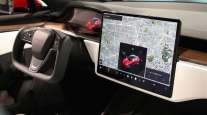Google Emails Show Internal Concern Over Losing Driverless Lead

Three years ago, the head of Google’s self-driving car project emailed co-founders Larry Page and Sergey Brin to sound an alarm.
“Over the last six months we have stopped playing to win and instead are now playing to minimize downside,” Chris Urmson wrote. The source of his worry: Uber.
That missive from Urmson, who left Google in 2016, was made public on Feb. 5 at the start of the dramatic trade secret theft trial between Uber Technologies Inc. and Google’s car unit, now a part of Alphabet Inc. called Waymo.
That email and other internal correspondence from 2015 and 2016 reveal deep concern about Google losing its lead in autonomous cars.
RELATED: Uber’s Kalanick: We didn’t hire waymo engineer to steal self-driving secrets
Google kicked off the modern driverless car age when it started its Chauffeur driverless car project in 2009, years before other companies. Despite that early start, rivals began to close the gap, especially Uber.
In his February 2015 email to Page and Brin, Urmson said Uber was acquiring people who he had suggested Google hire more than a year earlier “but was denied the opportunity to do so.”
“We have a choice between being the headline or the footnote in history’s book on the next revolution in transportation,” Urmson added, according to court filings by Uber that included several internal Google emails. “Let’s make the right choice.”
Another email from November 2015 showed that Google management was just as worried about losing Anthony Levandowski, the controversial autonomous vehicle engineer at the center of the current court battle.
In November 2015, Google research executive Astro Teller emailed the incoming head of the car project, John Krafcik, to warn that Page was concerned about Levandowski moving to rivals.
Levandowski emailed Page two months later arguing that Google was “losing our tech advantage fast.” The engineer wrote that Krafcik was too focused on cutting a deal with Ford Motor Co. (Waymo and Ford have never acknowledged any talks.)
Eighteen days later, Levandowski quit Google. The next day, a Google human resources executive wrote in an email that Page was “upset” about Levandowski’s exit. “Larry is worried he’s going to start something competitive,” the email read.
Urmson left Google in August 2016. That same month, Bloomberg News reported that Uber had acquired Otto, an autonomous vehicle business started by Levandowski earlier in the year.
“One of the significant effects of today’s Otto/Uber news is increased attrition risk for us,” Dmitri Dolgov, a top executive at Google and Waymo, wrote in an internal email on Aug. 19.
There were other “interesting and plentiful exit opportunities,” Dolgov added, citing Chinese search giant Baidu, ride-hailing companies Didi and Lyft and carmakers. That makes Google’s car project “look less competitive from the financial perspective, so I think we should be seriously concerned.”
With assistance by Joel Rosenblatt




